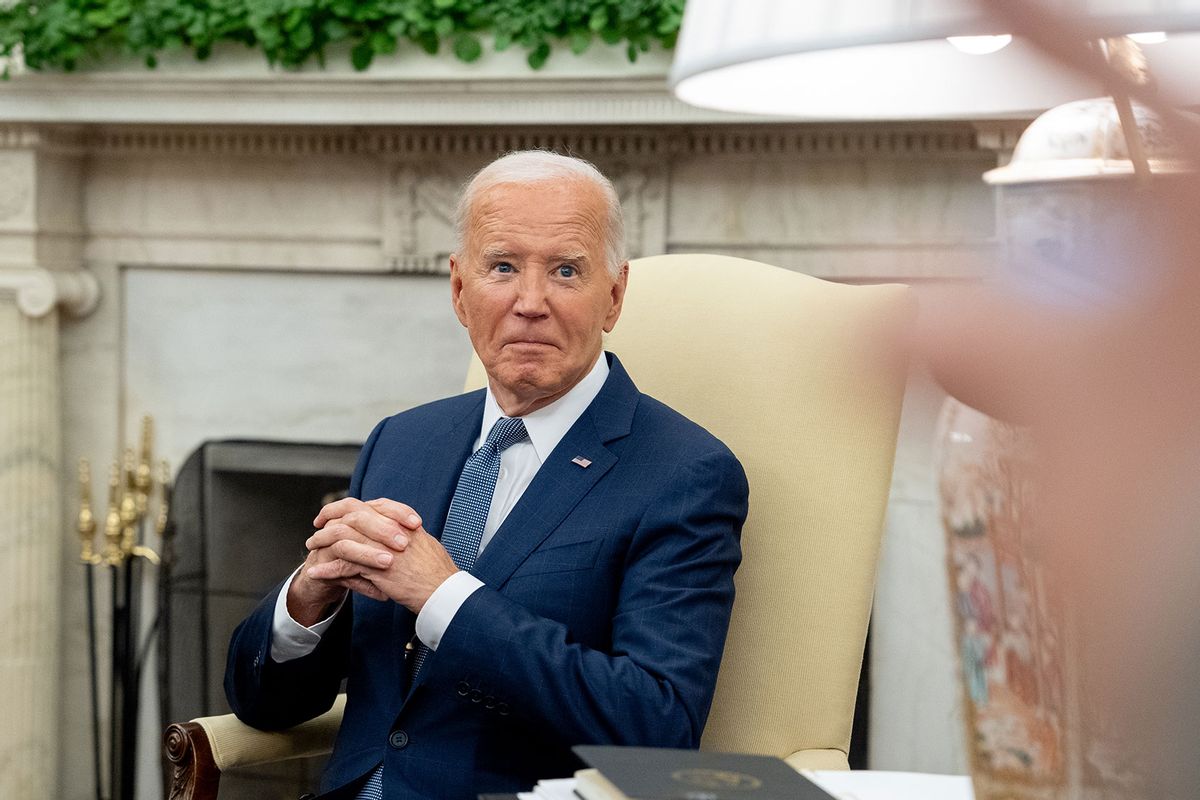President Joe Biden announced his proposal to reform the U.S. Supreme Court in an op-ed published in the Washington Post on Monday, castigating its right-wing majority for overturning settled legal precedents and failing to concretely address scandals involving justices. He began by taking aim at the court's decision to grant presidents broad immunity from prosecution for crimes while in office, warning that "if a future president incites a violent mob to storm the Capitol and stop the peaceful transfer of power — like we saw on Jan. 6, 2021 — there may be no legal consequences."
While Biden did not mention Donald Trump by name, it was clear that he had the former president in mind. It was Trump's attempts to overturn the 2020 election that led the court to vote 6-3, along ideological lines, to grant him immunity. "No one is above the law," Biden wrote. "Not the president of the United States. Not a justice on the Supreme Court of the United States. No one."
Biden's op-ed underscores his long-simmering frustration with the court, which has now finally led to him to respond to calls from within his party to take drastic action and hold it accountable. Biden acknowledged in the op-ed that he had "great respect for our institutions," but maintained that "dangerous and extreme decisions" and scandals that have caused the public to "question the court’s fairness and independence," including undisclosed gifts to justices from individuals with business before the court, left him with no choice.
"What is happening now is not normal, and it undermines the public’s confidence in the court’s decisions, including those impacting personal freedoms," he wrote. "We now stand in a breach."
Biden delved into the contents of his plan to reform the Supreme Court, which was informed by analysis from the bipartisan Presidential Commission on the Supreme Court of the United States that he set up earlier in his term. The first proposal is a constitutional amendment called the No One Is Above the Law Amendment, which would establish that there is no immunity for crimes that a former president has committed while in office. A constitutional amendment, named after what Biden called a "simple yet profound principle" that acted as a bedrock for the nation, would override the Supreme Court's decision to grant Trump immunity if successfully passed.
The second proposal is a rule that would impose term limits on Supreme Court justices, who currently serve for life or until they choose to retire. Biden wrote that he supports a system in which every two years, the president would appoint a justice that would serve an 18-year term. The Constitution does not expressly grant life tenure to Supreme Court justices, saying only that they “shall hold their offices during good behavior.” Term limits "would make timing for court nominations more predictable and less arbitrary," he wrote. "It would reduce the chance that any single presidency radically alters the makeup of the court for generations to come."
Biden was likely alluding to the three conservative justices that Trump was able to place on the court during his single term in office, more than the two that Bill Clinton, George W. Bush and Barack Obama appointed during each of their two-term presidencies. Trump was helped by a Republican Senate majority that blocked a potential third appointment by Obama, holding open the seat for a friendlier administration to fill.
We need your help to stay independent
The third proposal calls for a binding code of conduct for the Supreme Court that would require justices to disclose gifts, refrain from public political activity and recuse themselves from cases in which they or their spouses have conflicts of interest. Biden noted that every other federal justice in the country is bound by an enforceable code of conduct and opined that the Supreme Court should follow suit.
Those suggested rules in the code of conduct appear to respond directly to the scandals that have embroiled the court in recent years. In 2023, a ProPublica report revealed that Justice Clarence Thomas failed to disclose most of the $4 million he received in gifts since 2004, many of them from individuals who had business before the court. Other justices, including Samuel Alito, also accepted undisclosed gifts from such donors. Earlier in 2024, Alito received criticism for pro-insurrectionist flags that were raised outside of his homes in Virginia and New Jersey, then declining to recuse himself from cases related to the Jan. 6 storming of the Capitol.
Amid rising public anger at a court run amok with power, Chief Justice John Roberts issued a non-binding code of conduct in November 2023. But he declined to make it anything more than a set of unenforceable guidelines or to meet with Senate Judiciary Committee members to discuss the scandals, writing in a letter that to do so would raise concerns about the separation of powers.
Want a daily wrap-up of all the news and commentary Salon has to offer? Subscribe to our morning newsletter, Crash Course.
Biden's proposals are unlikely to become law before the end of his term. Republicans control the House of Representatives, and Democrats hold only a one-seat majority in the Senate, where some members of the Democratic caucus are still resistant to Supreme Court reform, especially if it is passed by eliminating the filibuster. A constitutional amendment to overturn the court's immunity decision, which has a higher threshold of passage in Congress, faces the additional process of ratification by three-fourths of state legislatures before it can be codified.
Still, Biden noted that the reforms are supported by most Americans, including a majority of Republicans, as well as a number of conservative and liberal constitutional scholars.
"We can and must prevent the abuse of presidential power. We can and must restore the public’s faith in the Supreme Court. We can and must strengthen the guardrails of democracy," Biden concluded. "In America, no one is above the law. In America, the people rule."



Shares